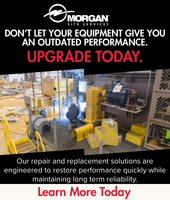Iron & Steel Technology

March Issue Now Online!
Cold Sheet Rolling, Processing, Coating & Finishing
Special Features Include:Table of Contents
54
Effect of Coiling Temperature on Bainite Transformation in Hot-Rolled Automotive Sheet Steel
Advanced high-strength steel (AHSS) is used extensively in automotive applications for its excellent formability, high strength with weight-reduction capacity and improved crashworthiness. An industrially processed as-cast AHSS slab sample (0.3C, 2.0Si, 2.5Mn) was hot rolled after being fully austenitized at 1,200°C, followed by isother-mal holding to simulate coiling temperature ranging from 500°C to 600°C for 24 hours, and later air cooled to room temperature. Bainite transformation was studied at subcritical temperature during coiling of AHSS sheet. A mixture of ferrite, bainite and retained austenite was evident in the hot-rolled microstructure. The effect of different coiling temperatures on morphology and mechanical properties (tensile, hardness, cold rollability) is discussed.
68
Process Line Debottlenecking and Process Improvement Through an Empirical Data-Driven Model
This article will discuss the development and troubleshooting capability of a process debottlenecking model for steel production facilities. This model utilizes Excel-based modules, incorporating production data, equipment designs and capabilities, and maintenance/delay information to build a customized replica of a process unit. Once the model is validated, different scenarios are tested to identify opportunities for equipment modifications or oper-ational changes that can debottleneck the process unit, increase production capacity and help reduce carbon emissions. This article will detail use cases, as well as opportunities for applying the model results.
80
Jet Vapor Deposition (JVD): The Obvious Future Choice for Zinc Coating of Steel
The galvanization of steel for the automotive industry or appliances presents certain challenges that are not com-pletely resolved by conventional technologies. The first of these challenges is the galvanization of third-generation advanced high-strength steel up to 290 ksi (2,000 MPa). Such steels chemistries require a high alloying content to obtain the desired mechanical characteristics. The second challenge is to produce exposed panels with the most advanced characteristics in terms of surface aspect, weldability, formability, coating uni-formity and corrosion resistance, together with a minimized OPEX. The third challenge is to coat hot-rolled mate-rial while reducing energy consumption. With jet vapor deposition (JVD), there is no need to heat the strip up to pot temperature then to cool down to ambient temperature like in hot-dip galvanizing. The strip is heated only to 212°F to avoid humidity. Once again, OPEX is minimized. This article will present how JVD overcomes those challenges and describe the main characteristics of this process.
88
Skinpass Mill and Tension Leveler for Ultrahigh-Strength Steel
This presentation introduces the latest technologies of skinpass mill and tension leveler in continuous annealing line (CAL)/continuous galvanizing line (CGL) for ultrahigh-strength steel, and hot skinpass mill with tension level-er for green steel. Recent flat products, including ultrahigh-strength steel for automobiles, are improving in per-formance and are processed with special treatments such as heat treatment, so flatness tends to be worse. There-fore, more powerful and more accurate flattening facilities are required. New technologies for skinpass mill and tension leveler have been developed and installed in the CAL, CGL, hot skinpass mill and pickling line.


.png?width=170&height=200&mediaprotectionhash=00e5f63e46451a027fd2ad60ef41fda4c4a88517f310e6fa680cd586c153a630&ext=.png)